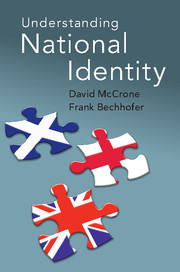Book contents
- Frontmatter
- Contents
- List of tables
- Preface
- Introduction
- 1 Thinking about national identity
- 2 Accessing national identity
- 3 National identity: do people care about it?
- 4 Debatable lands: national identities on the border
- 5 Claiming national identity
- 6 The politics of national identity
- 7 The notional other: ethnicity and national identity
- 8 A manner of speaking: the end of being British?
- 9 Whither national identity?
- Appendix National identity publications
- Bibliography
- Index
Introduction
Published online by Cambridge University Press: 05 April 2015
- Frontmatter
- Contents
- List of tables
- Preface
- Introduction
- 1 Thinking about national identity
- 2 Accessing national identity
- 3 National identity: do people care about it?
- 4 Debatable lands: national identities on the border
- 5 Claiming national identity
- 6 The politics of national identity
- 7 The notional other: ethnicity and national identity
- 8 A manner of speaking: the end of being British?
- 9 Whither national identity?
- Appendix National identity publications
- Bibliography
- Index
Summary
It seems reasonable to assume that anyone who picks up this book does so because they are interested in understanding national identity. After all, that is the title of the book, and our purpose in writing it is to explain our approach to national identity and present the empirical evidence which has led us to understand it in the way we do. We must make it clear right from the outset that the book is not centrally, or even largely, concerned with constitutional change. We are well aware that to some people it seems self-evident that the two must be inextricably entwined. The way political events in the United Kingdom have been reported since devolution in 1999 and the tendency in the media to assume a strong association between national identity and matters of governance has served to encourage that belief. The book will appear relatively soon after the referendum on Scottish independence held in September 2014, which is why we wish right at the outset to say that it is not about the referendum, and after this Introduction that momentous event will largely disappear from view in these pages. There are two reasons for this. Our intellectual focus over twenty years has been on various aspects of national identity. We do, of course, have our views, both personal and intellectual, about constitutional change, but that is not what our empirical research has been about, and this book is concerned with that research. Second, the connection between national identity and people's political and constitutional preferences is considerably looser than one might expect. We do not want to mislead the reader, so it is necessary to emphasise that the title of the book accurately describes its contents, which is at it should be.
How did we first become interested in national identity? Truth to tell, it is impossible to say. One of us has lived in Scotland for all of his life and the other for most of it. If you do that, national identity is pervasive and yet implicit. We are fond of a comment by the novelist Willie McIlvanney that ‘having a national identity is a bit like having an old insurance policy.
- Type
- Chapter
- Information
- Understanding National Identity , pp. 1 - 5Publisher: Cambridge University PressPrint publication year: 2015

